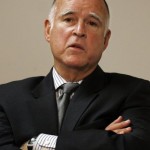BY PETER SCHEER—As California voters begin the process of selecting the next Governor of the ungovernable Golden State, the leading candidates owe them a demonstration of their commitment to government transparency.
 All politicians are supportive of open-government “in principle;” the question is whether they are committed in practice. The best test for that is a candidate’s willingness, before an election, to disclose information about himself that is not legally required to be disclosed–but that voters nonetheless want, with good reason, to see.
All politicians are supportive of open-government “in principle;” the question is whether they are committed in practice. The best test for that is a candidate’s willingness, before an election, to disclose information about himself that is not legally required to be disclosed–but that voters nonetheless want, with good reason, to see.
For Republican candidate Meg Whitman, the test will be whether she decides to release her tax returns. For Attorney General Jerry Brown, presumptive democratic nominee, the test will be whether he opens wide the door to the  records of his previous governorships.
records of his previous governorships.
Whitman thus far has resisted journalists’ requests for a copy of her tax returns. She is, of course, within her rights, legally, in doing so. But in 2010 that is not a right on which a candidate can stand and still expect to be competitive in an election for high office.
Voters’ interest in a candidate’s tax returns is not just voyeuristic. In the case of a wealthy candidate like Whitman, the former CEO of eBay, tax returns can be a window on her character, showing, for example: whether she is generous with charitable contributions and who benefits from her giving (her alma mater? people in need?); whether she has been aggressive in the use of tax shelters to avoid tax; and how her tax rate compares with the rates that most voters pay.
These data points are both revealing and a matter of legitimate interest to voters. Disclosing tax returns is part of California’s political culture for governors. Schwarzenegger has released his taxes. So did Gray Davis and Whitman’s fellow eBay millionare, Steve Westly. If Whitman’s tax returns contain information that is embarrassing, all the more reason to release them now, before public attention focuses on the governor’s race. An embarrassing tax return can even be spun positively—for example, as proof that Whitman is a true outsider who never planned to enter politics.
But disclose the returns she must.
As candidate for Governor, Jerry Brown has left a long paper trail. Not just his years as AG or as mayor of Oakland, but also his two terms as Governor from 1975 to 1983. But don’t go looking for the records of his governorship, which are stashed in an archive at University of Southern California in Los Angeles. Under an obscure provision of the Public Records Act (Gov Code section 6268), governors, once they leave office, have the option of locking away their gubernatorial records for a “period of 50 years or the death of the Governor, whichever is later.”
Jerry Brown has exercised this option, which means that all the public records of his governorship–including the anti-tax groundswell that resulted in Prop 13, Brown’s opposition to the death penalty, his battles with California’s oil companies over tax and environmental issues, and much more–are exempt from the Public Records Act.
Put aside for a moment the absurdity of California’s 50-year secrecy rule (the records of US presidents, by contrast, are closed off for only 12 years). Brown’s pledge of government transparency can’t be taken seriously as long as he continues to invoke the Public Records Act’s exemption for his gubernatorial records–records which were public while he was governor, which were paid for by taxpayers, and which are now more than 27 years old.
In fairness to Brown, he is willing to pry open the door to these documents on a case-by-case basis. In response to the First Amendment Coalition’s record request, Brown, through his lawyer, offered to “waive the fifty-year access restriction . . . as to” the organization’s executive director, and he has done the same for several reporters. But the point is that no government official should get to pick and choose who can see public records. Selective access to information and freedom-of-information are mutually exclusive.
The test for Brown is whether, in advance of the election, he will waive–for the public generally–the 50-year exemption for his gubernatorial records, giving access to all (subject, of course, to the exceptions in the law that apply to any public records). Brown can do this with a stroke of the pen, just as he invoked the exemption in the first place.
If he refuses, voters will not only have reason to doubt Brown’s open-government credentials. They will wonder if there’s something in the archive that he is trying to hide.
——
Peter Scheer is executive director of the First Amendment Coalition
